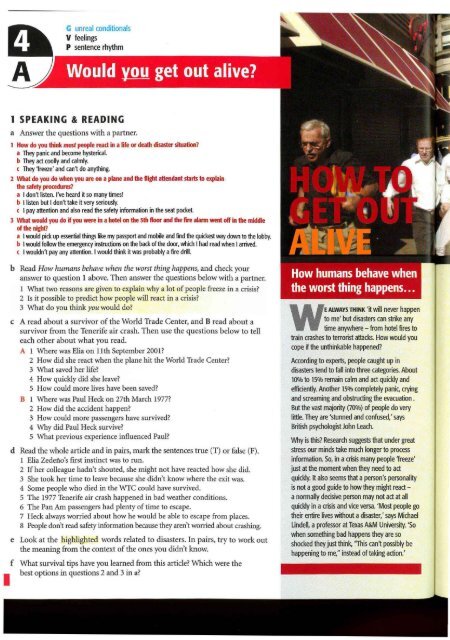Upper-intermediat 5tudenf Book
Create successful ePaper yourself
Turn your PDF publications into a flip-book with our unique Google optimized e-Paper software.
(i unreal conditionals<br />
V feelings<br />
P sentence rhythm<br />
I SPEAKING & READING<br />
a Answer the questions with a partner.<br />
1 How do you think most people read in a me or death disaster situation?<br />
a They panic and become hysterical.<br />
b They ad coolly and calmly.<br />
c They 'freeze' and can't do anything.<br />
2 What do you do when you are on a plane and the flight attendant starts to explain<br />
the safety procedures?<br />
a I don't listen. I've heard it so many times!<br />
b I listen but I don't take rt very seriously.<br />
c I pay attention and also read the safety information in the seat pocket.<br />
3 What would you do if you were in a hotel on the sth floor and the fire alarm went off in the middle<br />
of the night?<br />
a I would pick up essential things like my passport and mobile and find the quickest way down to the lobby.<br />
b I would follow the emergency instructions on the back of the door, which I had read when I arrived.<br />
c I wouldn't pay any attention. I would think it was probably a fire drill.<br />
I<br />
b Read How humans behave when the worst thing happens, and check your<br />
answer to question 1 above. Then answer the questions below with a partner.<br />
1 What two reasons are given to explain why a lot of people freeze in a crisis?<br />
2 Is it possible to predict how people will react in a crisis?<br />
3 What do you think you would do?<br />
c A read about a survivor of the World Trade Center, and B read about a<br />
survivor from the Tenerife air crash. Then use the questions below to tell<br />
each other about what you read.<br />
A 1 Where was Elia on 11th September 2001?<br />
2 How did she react when the plane hit the World Trade Center?<br />
3 What saved her life?<br />
4 How quickly did she leave?<br />
5 How could more lives have been saved?<br />
B 1 Where was Paul Heck on 27th March 1977?<br />
2 How did the accident happen?<br />
3 How could more passengers have survived?<br />
4 Why did Paul Heck survive?<br />
5 What previous experience influenced Paul?<br />
d Read the whole article and in pairs, mark the sentences true (T) or false (F),<br />
1 Elia Zed en a's first instinct was to run.<br />
2 If her colleague hadn't shouted, she might not have reacted how she did.<br />
3 She took her time to leave because she didn't know where the exit was.<br />
4 Some people who died in the WTC could have survived.<br />
5 The 1977 Tenerife air crash happened in bad weather conditions.<br />
6 The Pan Am passengers had plenty of time to escape.<br />
7 Heck always worried about how he would be able to escape from places.<br />
8 People don't read safety information because they aren't worried about crashing.<br />
e Look at the highlighted words related to disasters. In pairs, try to work out<br />
the mearting from the context of the ones you didn't know.<br />
f What survival tips have you learned from this article? Which were the<br />
best options in qnestions 2 and 3 in a?<br />
WE ALWAYS THINK '~will never happen<br />
to me' but disasters can strike any<br />
time anywhere - from hotel fires to<br />
train crashes to terrorist attacks. How would you<br />
cope if the unthinkable happened?<br />
According to experts, people caught up in<br />
disasters tend to fall into three categories. About<br />
100/0 to 15% remain calm and act quickly and<br />
efficiently. Another 15% completely panic, crying<br />
and screaming and obstructing the evacuation.<br />
But the vast major~ (70%) of people do very<br />
little. They are 'stunned and confused: says<br />
British psychologist John Leach.<br />
Why is this? Research suggests that under great<br />
stress our minds take much longer to process<br />
information. So, in a crisis many people 'freeze'<br />
just at the moment when they need to act<br />
quickly. It also seems that a person's personality<br />
is not a good guide to how they might react -<br />
a normally decisive person may not act at all<br />
quickly in a crisis and vice versa. 'Most people go<br />
their entire lives w~out a disaster: says Michael<br />
Lindell, a professor at Texas A&M University. 'So<br />
when something bad happens they are so<br />
shocked they just think, "This can't possibly be<br />
happening to me," instead of taking action:


